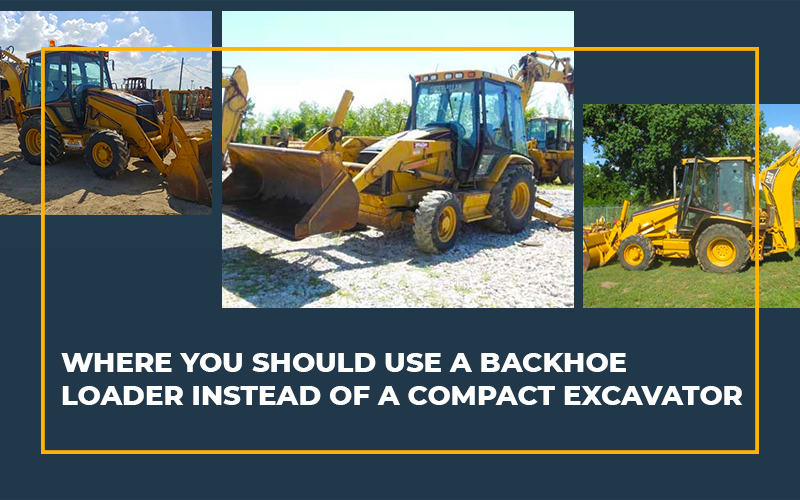Over past few years, smaller equipment such as compact excavators have made headway on the industrial site’s trusty staple, the backhoe loader. Backhoe loaders and compact excavators, on the flip side, both have their own characteristics, and one equipment may be preferable for your upcoming earthmoving job than the alternative.
Compact Excavator
The small size of a compact excavator is indeed one of its key features. This in and of itself helps make it more fuel-efficient, while also making it more maneuverable. Its mobility, width and compact swing enable it to enter areas that a backhoe loader would not be able to.
Smaller size, on the other hand, entails lesser weight and, as a result, lower ground pressure for susceptible surfaces. A 34-ton pickup truck with a trailer could also tow a compact excavator.
Compact excavators come in a range of classifications based on their power, size, and weight, and are ideal for small to medium landscaping, trenching, and drilling jobs. Interior demolition works and worksites with load constraints benefit from the tiniest compact excavators. Many entrances and backyard doors can accommodate them. They allow several attachments, brush mowers, concrete breakers, augers, and grapples are among the compact excavator attachments that are available.
Backhoe Loader
Backhoe loaders are large and powerful machines. They are an ideal machine for massive operations which require a great deal of power and speed. A backhoe could dig Twelve to Sixteen feet on average. They could go up to 25 miles an hour on highways between jobsites and swiftly traverse enormous construction sites. Furthermore, their outriggers offer excellent stability on rough terrain, you can find new and used backhoes for sale online easily.
The equipment may be able to do a larger range of tasks than a compact excavator due to the front-end loader and the multitude of attachments that may be used with a backhoe loader. Road brooms, buckets, snow ploughs, and drum compactors are among the backhoe’s potential accessories.
Practical considerations for the worksite
When you have a project that requires a machine that is capable of earthmoving you will likely think of one of these two machines immediately. However before choosing which one of these machines will be best for your project make sure to consider the construction site you will be working on.
Whichever excavator is ideal for you varies depending on the jobsite(s) that you are working on and the operations you are undertaking. Compact excavators are an ideal choice for jobs with limited space, such as indoor deconstruction or swimming pool construction.
Backhoes provide a horsepower improvement for digging deeper and hauling bigger loads on large projects that necessitate speed and capacity. These machines are frequently seen working on home construction projects as well as highways and bridges restorations. Their capacity to move from one worksite to another without the need of a trailer is also helpful.
Both machines have their own benefits and considering the worksite requirements will provide you with an answer as to which one is best for your project. Once you figure out these details you will be able to decide whether you need a loader or an excavator for the job.

